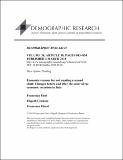Files in this item
Economic reasons for not wanting a second child : changes before and after the onset of the economic recession in Italy
Item metadata
| dc.contributor.author | Fiori, Francesca | |
| dc.contributor.author | Graham, Elspeth | |
| dc.contributor.author | Rinesi, Francesca | |
| dc.date.accessioned | 2018-03-05T11:30:06Z | |
| dc.date.available | 2018-03-05T11:30:06Z | |
| dc.date.issued | 2018-03-02 | |
| dc.identifier | 252459106 | |
| dc.identifier | fabf9be4-38ac-477c-9c47-d121970caf63 | |
| dc.identifier | 85043249147 | |
| dc.identifier | 000427327600001 | |
| dc.identifier.citation | Fiori , F , Graham , E & Rinesi , F 2018 , ' Economic reasons for not wanting a second child : changes before and after the onset of the economic recession in Italy ' , Demographic Research , vol. 38 , 30 , pp. 843-854 . https://doi.org/10.4054/DemRes.2018.38.30 | en |
| dc.identifier.issn | 1435-9871 | |
| dc.identifier.other | RIS: urn:A756640B100FD79AF4322CED98FEE384 | |
| dc.identifier.uri | https://hdl.handle.net/10023/12847 | |
| dc.description.abstract | Objective : This study aims to understand changes in the fertility intentions of mothers residing in Italy before and after the onset of the economic recession. It focuses particularly on mothers with one child – a group whose intentions changed over the period – and especially on those who, before and after the economic crisis of 2007–2008, cite economic reasons for intending not to have a second child. Methods : The analysis uses data from the ISTAT sample survey on births and mothers and fits logistic regressions (for 2002 and 2012), with economic vs. other reasons for intending not to have a second child as the dependent variable, in order to compare the associated sociodemographic profiles of mothers for the two years. Results : In Italy, between 2002 and 2012, the fertility intentions of mothers with one child changed. The proportion intending to ‘stop at one’ increased, with more mothers giving economic constraints rather than personal preferences as their main reason for intending not to have another child. Moreover, socioeconomic differences among primiparous mothers reporting economic constraints as their main reason for intending not to have a second child narrowed, whereas age differences became more pronounced. Contribution : The study is one of the few that has examined the reasons behind fertility intentions, especially those of mothers intending not to have a second child. It shows that one important impact of the economic recession in Italy is that a greater proportion of primiparous mothers are now abandoning the two-child norm in response to adverse economic circumstances. As a consequence, Italy is likely to remain a low-fertility country for some time to come. | |
| dc.format.extent | 12 | |
| dc.format.extent | 1004731 | |
| dc.language.iso | eng | |
| dc.relation.ispartof | Demographic Research | en |
| dc.subject | HB Economic Theory | en |
| dc.subject | HQ The family. Marriage. Woman | en |
| dc.subject | 3rd-NDAS | en |
| dc.subject.lcc | HB | en |
| dc.subject.lcc | HQ | en |
| dc.title | Economic reasons for not wanting a second child : changes before and after the onset of the economic recession in Italy | en |
| dc.type | Journal article | en |
| dc.contributor.institution | University of St Andrews. School of Geography & Sustainable Development | en |
| dc.identifier.doi | 10.4054/DemRes.2018.38.30 | |
| dc.description.status | Peer reviewed | en |
This item appears in the following Collection(s)
Items in the St Andrews Research Repository are protected by copyright, with all rights reserved, unless otherwise indicated.

